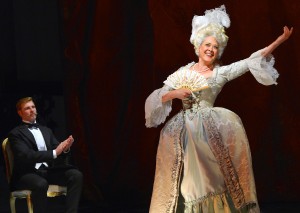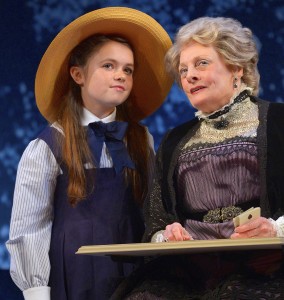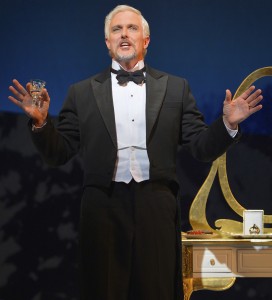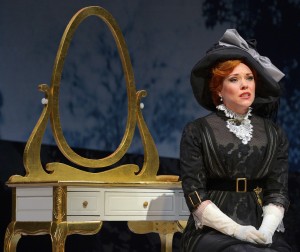[Woody’s [rating: 3.5]

Desiree Armfeldt (Karen Ziemba) struts her stuff in “A Little Night Music” while Mr. Lindquist (Brandon Dahlquist) looks on. Photo by Kevin Berne.
My wife nailed it.
“You gotta look at it in a historical perspective,” she told me as we exited A.C.T.’s “A Little Night Music” amid my doubts about how to assemble this review.
So I started thinking about time.
• About the musical’s setting being Sweden at the turn of the 20th century.
• About Ingmar Bergman, whose 1955 partner-switching film, “Smiles of a Summer Night,” was heavily mined in 1973 by Stephen Sondheim for his “Night Music” music and lyrics and Hugh Wheeler for the book.
• About its revolving door sexuality and aging themes retaining their relevance in 2015.
My wife’s always liked Sondheim better than I, branding his lyrics, humor and internal rhymes brilliant (we agree his music’s more non-melodic and difficult than most Broadway composers).
I’d never argue with his genius, yet he’s always been too bleak for my tastes.
Sondheim’s initial materials for “Night Music,” it should be noted, were much darker and melancholy than eventually staged.
No surprise.
But “Night Music” does include one of my favorite ballads, the show-stopping “Send in the Clowns,” as well as the lilting “A Weekend in the Country.”
I also admit to enjoying three short, wistful pieces that together put the time arcs in focus (“Now,” “Later” and “Soon”).
And a tone poem extolling the glories of yesterday (“Remember”).
And the waggish “You Must Meet My Wife.”
I was less enthusiastic about “The Miller’s Son,” which the opening night crowd applauded wildly because of a powerful delivery by Melissa McGowan as Petra, a sexpot maid who frequently flaunts her body in hopes of a hook-up.
Yes, it’s the actors who ultimately make the difference, especially Tony Award-winner Karen Ziemba as a disarming, lusty older stage star, Desiree Armfeldt.
Also topping my list is Patrick Cassidy, a Great White Way veteran who plays Fredrik Egerman, Desiree’s then-and-now suitor despite having being married for 11 months to an empty-headed, still virginal 18-year-old Anne (Laurie Veldheer) who contemplates studying Italian only “if the verbs are not too irregular.”
Others I applaud are Dana Ivey as Madame Armfeldt, family matriarch whose facial expressions bring to mind the best of Maggie Smith and who believes that “to lose one’s husband can be vexing…but to lose one’s teeth can be a catastrophe,” and Emily Skinner as Charlotte Malcolm, wife of a philandering warrior (she cynically thinks “love is a dirty business…disgusting…insane”).
Deserving her place in the sun, too, is Brigid O’Brien, a Novato eighth-grader previously featured in The Mountain Play’s “Sound of Music” and “Music Man” and the Ross Valley Players’ “To Kill a Mockingbird.”
Here she portrays Fredrik’s teenage daughter, Fredrika, and is quite remarkable.
For any age — but particularly for hers.
Most of those singing voices are excellent (so commendable, in fact, they make Paolo Montalban’s in the Count Carl-Magnus Malcolm role seem humdrum).
And costumes and hats by Candice Donnelly are so lush — in effect, a parade of fashion worthy of a de Young Museum exhibit — they nearly outdo everything else on stage.
The plot?
Well, it resembles a classic French sexual roundelay and could play as a farce if it didn’t want to deal at least superficially with life’s major dilemmas and dramas.
Lust’s the operative word.
Fredrik pines for Desiree, who excites Count Carl-Magnus, too. Madame Armreldt pines for royal liaisons past. Henrick, Fredrik’s son, pines for Anne. And Petra pines for males in general.
Mark Lamos, who was challenged to equal legendary director-producer Hal Prince, who led the ‘73 “Night Music” version, directed this company.
But he accomplishes his apparent goal — to make the show, like its onstage waltzes, “all about flirtation and eroticism.”
He’s aided by Val Caliparoli’s elegant choreography that incorporates lots of mystery, masks and twirling.
Bottom line: Although flawed, the musical’s a grand peek into youthful passions and aging memories, a who-wants-to-bonk-who tableau set against a midsummer night’s dream-setting at a country estate to Sweden in the late 1900s.
It’ll probably still be playing somewhere in 3015.
“A Little Night Music” plays at the American Conservatory Theater, 415 Geary St., San Francisco, through June 21. Night performances, 7 p.m., Tuesday, June 2 and Sunday, June 21; 8 p.m. Tuesdays through Saturdays. Matinees, 2 p.m. Wednesdays, Saturdays and Sundays. Tickets: $20 to $140. Information: (415) 749-2228 or www.act-sf.org.
Contact Woody Weingarten at www.vitalitypress.com/ or voodee@sbcglobal.net





